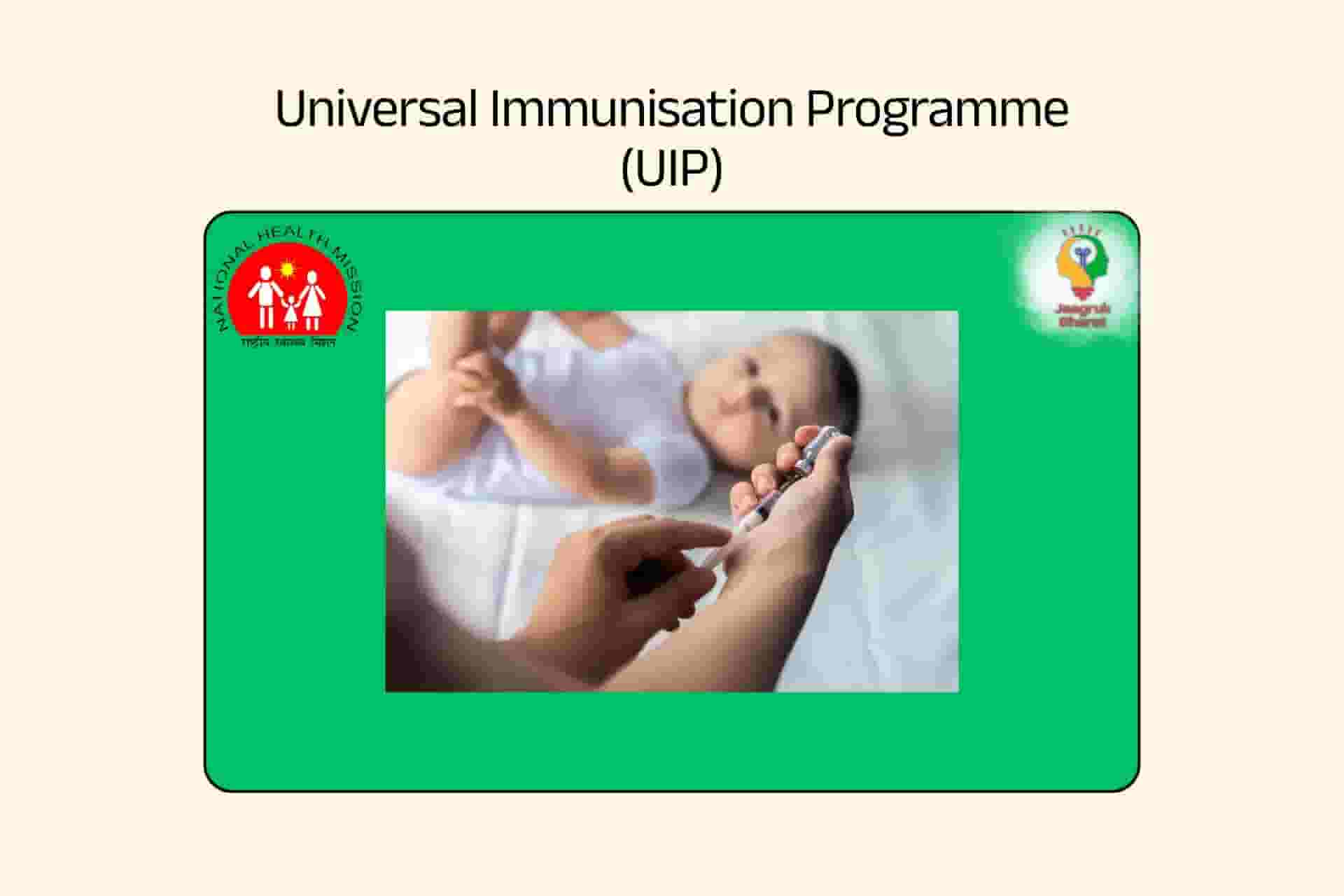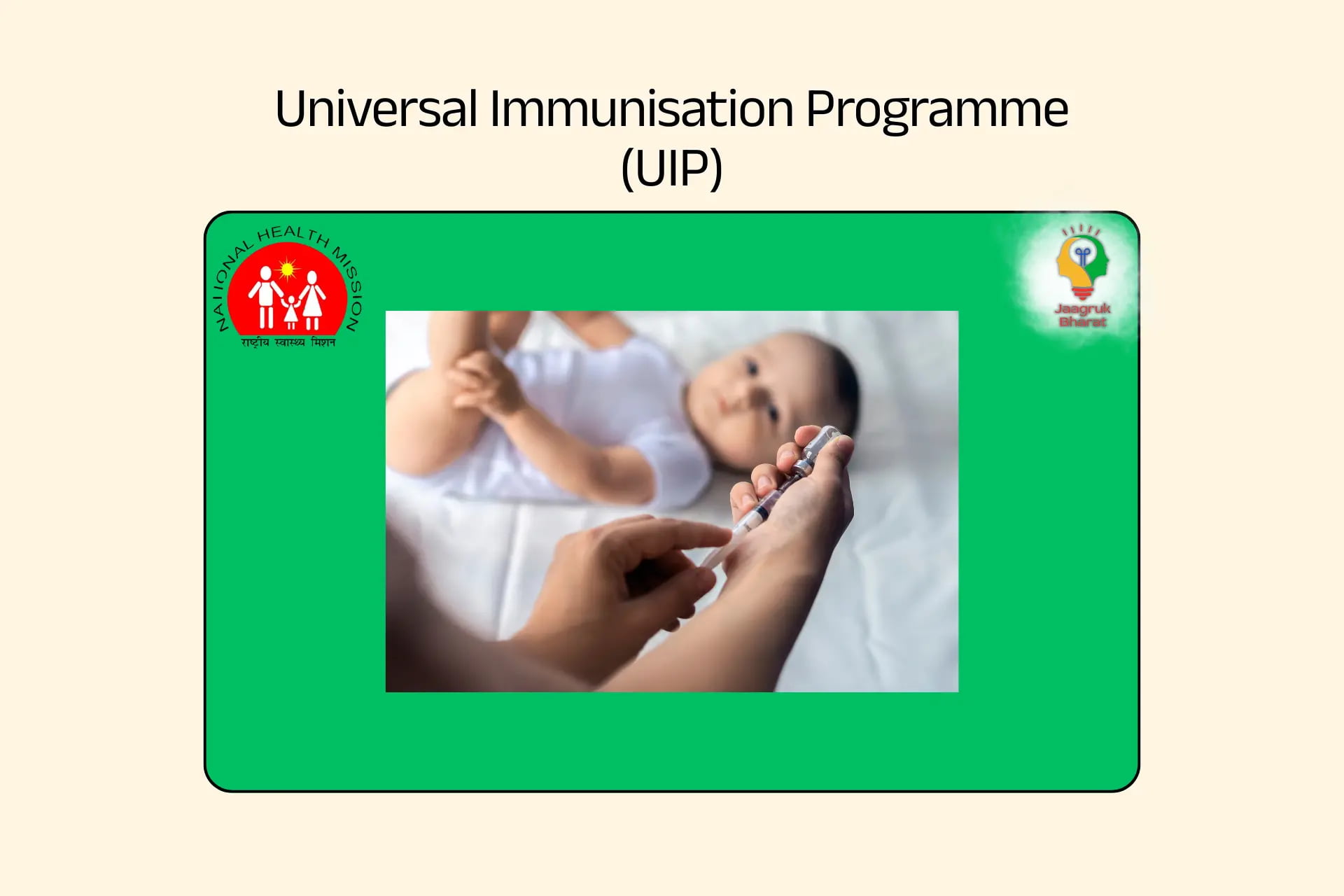A Comprehensive Guide To India's Universal Immunisation Programme (UIP)
Updated: 13-10-2025 at 7:28 AM
2k


The Universal Immunization Programme (UIP) is unarguably the world’s largest public health project. The government program began operations in 1985 as an extension of the Expanded Programme on Immunisation (EPI). The goal of the UIP is to offer free immunisation services to avert diseases that could potentially endanger the lives of infants and expectant mothers. The UIP remains committed to its vision and continues to evolve through the introduction of advanced technologies, ensuring no one is left behind in the battle against vaccine-preventable diseases. This project is part of the Indian health system's priorities and will help millions in the present as well as future generations.
In this article, we will learn about the UIP government program in complete detail, from its impact and challenges to future prospects.
Overview
| Feature | Details |
|---|---|
| Launch Year | 1985 |
| Target Population | 27 million newborns and 30 million pregnant women annually |
| Diseases Covered | Tuberculosis, Hepatitis B, Measles, Tetanus, Polio, Diphtheria, Rotavirus diarrhoea, Japanese encephalitis |
| Technological Integration | Electronic Vaccine Intelligence Network (eVIN) for vaccine tracking and cold chain management |
| Supplementary Initiative | Mission Indradhanush for increasing coverage in low-immunisation areas |
| Impact | Significant decline in vaccine-preventable diseases; improved maternal and child health |
| Funding | Fully funded by the Government of India |
| Challenges | Vaccine hesitancy, logistics in remote areas, maintaining cold chain |
| Vision | 100% immunisation coverage and improved public health |
Read More: Rashtriya Bal Swasthya Karyakram (RBSK)
Universal Immunisation Schedule
The Universal Immunization Schedule (UIS) is a comprehensive vaccination programme in India designed to protect children and pregnant women from preventable diseases. It ensures the timely delivery of essential vaccines, promoting public health and reducing mortality rates.
Key Vaccines Under UIS
- BCG (Bacille Calmette-Guerin): Prevents tuberculosis.
- Administered at birth or as early as possible.
- OPV (Oral Polio Vaccine): Prevents poliomyelitis.
- Given at birth, 6, 10, and 14 weeks, followed by booster doses.
- Hepatitis B Vaccine: Prevents hepatitis B infection.
- Administered at birth, 6, 10, and 14 weeks.
- Pentavalent Vaccine: Protects against diphtheria, pertussis, tetanus, hepatitis B, and Hib.
- Given at 6, 10, and 14 weeks.
- Measles and Rubella (MR) Vaccine: Prevents measles and rubella.
- Administered at 9-12 months and 16-24 months.
- Rotavirus Vaccine: Protects against rotavirus diarrhoea.
- Given at 6, 10, and 14 weeks.
- Japanese Encephalitis Vaccine: Prevents Japanese encephalitis in high-risk areas.
- Administered at 9-12 months and 16-24 months.
- Td (Tetanus and Adult Diphtheria): For pregnant women and adolescents.
- Given during pregnancy (1st dose early and 2nd dose at least 4 weeks apart).
Importance of UIS
-
Ensures timely protection against major diseases.
-
Reduces infant and maternal mortality rates.
-
Promotes health equity by reaching underserved populations.
-
Contributes to the eradication of diseases like polio in India.
About
The Universal Immunization Programme (UIP) 2024 in India is a well-planned strategy which counters potentially fatal diseases through vaccines. Commencing from 1985 onwards the UIP was an extension to the Expanded Programme on Immunisation (EPI) which started in 1978 to rank among the biggest public health capital projects in the world.
Historical Backdrop
Freeness and affordability for vaccines constrained the transformation of the EPI into UIP. The concept of EPI morphed into UIP to widen the coverage of vaccines physically to places away from urban areas and the needy and to lower child and maternal deaths caused by vaccine-preventable diseases.
Read More: Understanding National Health Mission
UIP's Target Demographic
In India alone, around annually 2.7 crore (27 million) newborns and about 3 crore (30 million) pregnant women coming under the scope of the UIP are offered free vaccines for eleven diseases. Pediatricians also vaccinate against these illnesses including polio post-natal, tuberculosis, measles, and preventable hepatitis B, newer vaccines include pneumococcal conjugate aimed at warding off pneumonia which takes the lives of many infants yearly.
Vaccines And Diseases Covered
Under UIP, children and pregnant women receive vaccinations against critical diseases. The list of diseases under the government health scheme is mentioned below.
-
Tuberculosis
-
Hepatitis B
-
Measles
-
Tetanus
-
Poliomyelitis
-
Diphtheria
-
Plus vaccines for newer challenges like rotavirus diarrhoea and Japanese encephalitis in certain regions.
Technological Advancements In UIP
The use of technologies such as the Electronic Vaccine Intelligence Network (eVIN) has greatly improved the processes of vaccine storage as well as stock management maintaining an efficient cold chain & availability of vaccines at the right time throughout the nation.
Mission Indradhanush
Augmenting the UIP’s efforts, Mission Indradhanush aims to contribute to areas reporting low immunisation coverage so that the spread is made wider and no child or pregnant woman is left at risk of a preventable disease.
Read More: Integrated Disease Surveillance Program
Impact Of UIP
The impact of the UIP has been transformative, and it’s changing the lives of millions of children and mothers every year.
-
Massive decline in deaths due to vaccine-based illnesses.
-
Benevolent improvement in the health condition of millions of children and future mothers.
-
Ramping up the public health system for well-organised, widespread vaccination programs.
Challenges And Forward Path
Though it has achieved many, UIP also faces challenges in accessing remote areas, addressing vaccine hesitancy, and logistics concerning maintaining the cold chain of vaccines. Even so, the government is still developing and changing maps for the ways of implementation of this programme to remove these obstacles and extend the scope of this life-saving program.
Government's Commitment
The programme’s 100% funding by the Indian government underlines its commitment not just to healthcare provision but to making every effort to create a healthier and sustained future for every child and woman.
Read More: Rashtriya Arogya Nidhi Health Minister’s Cancer Patient Fund
Conclusion
The Universal Immunization Programme (UIP) in India showcases the commitment of Indians towards their health and keeping disease at bay. Even as the program continues to grow and change in response to new maternal and child health needs, the UIP is still very important in the enhancement of the health care system in the world and reduction of the problems associated with communicable diseases in the country.
Join the Jaagruk Bharat community today to stay informed and empowered! Visit Now.
Government Sources
Frequently Asked Questions
0
0
2k
0
0
2k Views
0
No comments available





Our Company
Home
About
T&C
Privacy Policy
Eula
Disclaimer Policy
Code of Ethics
Contact Us
Careers
Cancellation & Refund Policy
Categories
Women
Insurance
Finance
Tax
Travel
Transport & Infrastructure
Food
Entertainment
Communication
Government ID Cards
E-commerce
Traffic guidelines
Miscellaneous
Housing and Sanitation
Sports
Startup
Environment and Safety
Education
Agriculture
Social cause
Employment
Disclaimer: Jaagruk Bharat is a private organization offering support for documentation and government scheme access. We are not affiliated with any government body. Official services are available on respective government portals. Our goal is to make processes easier and more accessible for citizens.
All Copyrights are reserved by Jaagruk Bharat